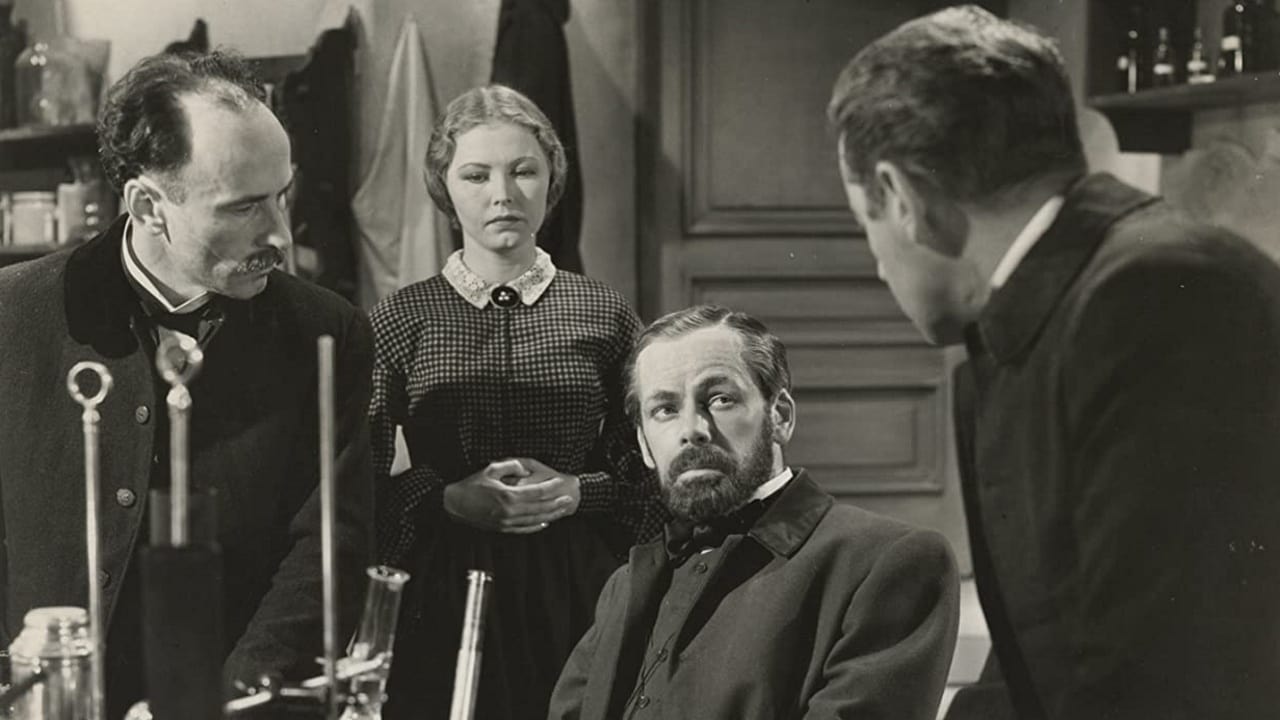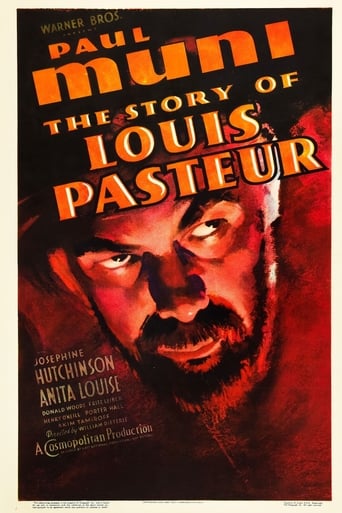

This true story of the French scientist's battle to establish modern medical methods is not to be missed. It features Paul Muni's Academy Award winning Best Actor performance. The strong supporting cast includes: Josephine Hutchinson as his dependable wife, Anita Louise as his daughter, Dickie Moore as a child who gets rabies, and Henry O'Neill, Porter Hall and Akim Tamiroff (among others) as doctors. The film also won both writing Oscars and was nominated for Best Picture too. Directed by William Dieterle.Pasteur is an outstanding scientist, one whose discipline and methods allow him to achieve great insights, enabling him to discover the root causes of deaths in livestock and people (e.g. germs). Unfortunately, since he is not a doctor, much of what he learns is discarded or viewed with suspicion, seemingly none of what he says is believed. However, during his struggle for credibility, he slowly wins over his former critics and is recognized today for many great accomplishments, including the discovery of several diseases, how they spread, and preventative vaccines.
... View MoreThis movie is of a type that Hollywood can no longer make in the same way. If you compare it to something recent like the new movie about Steve Jobs, of that title, you can see what I mean. In the latter movie, Jobs faces doubters and adversity, but there is never the idea that he does so to save humanity; he wants to prove himself right. In *The Story of Louis Pasteur," Pasteur (movingly portrayed by Paul Muni, who won an Academy Award for his portrayal) is driven by a desire to help his fellow man, and he speaks of it in noble tones.Like *Edison, the Man* (1940) or *Madame Curie* (1943), *The Story of Louis Pasteur focuses on a scientist's dogged pursuit of a discovery despite endless repeated failures. (*Edison, the Man* does this particularly well.) The scientist also bears up under repeated public derision because of those failures, proving himself to be right in the end. As a model of self-denial and perseverance in the pursuit of a greater common good, this movie is particularly good. Compare it to *Steve Jobs* and you can see that.But, despite the noble model it provides, it really isn't a particularly enthralling movie. (There, *Steve Jobs* is much better.) I find it very hard to understand why it won the 1937 Oscar for best screenplay, especially given that it was up against *Dodsworth*, *Mr. Deeds goes to Town*, and *My Man Godfrey*. Yes, Pasteur's final speech to the Academy of Science and Medicine is moving, but much of the script before that is rather flat. (It was not even nominated for Best Director, and that is telling.) The story this movie tells is a great one, but it doesn't really tell it very powerfully.It's certainly worth seeing, but I can't imagine seeing it more than once, unlike some of its 1937 contenders for Best Picture, mostly notably *Dodsworth*, *Mr. Deeds goes to Town* (HOW many times have I seen that?), *San Francisco*, and especially *A Tale of Two Cities,* which is a real masterpiece.
... View MoreMuni does give a good performance in this film, but he gets no help at all from a comically inept screenplay. You keep expecting someone to say "Eureka! I've got it!". Things wouldn't be more preposterous or clichéd if they did.I realize movies date over time, but I love older films and usually find them far, far better written than their more recent counterparts. This film is a sorry exception.Pasteur's efforts, struggles and eventual triumphs would certainly make a worthy subject for a good film biography. This, sadly, is not it.I think the Academy was acknowledging what Muni had to contend with in awarding him for this. Had they waited, he might have been awarded for an equally good performance in a much better movie (THE LIFE OF EMILE ZOLA) one year later.
... View MoreApparently none of the previous reviewers,most of whom praise the film for its accuracy, have actually read a biography of Louis Pasteur.The most glaring inaccuracy is in the relationship between Pasteur and Napoleon III.Back in the 1930's the latter was invariably shown in a bad light.While far from an admirable character-he was an inept politician and a self-appointed "military genius" who allowed France to be dragged into a disastrous war,he was not the stupid reactionary depicted here. He had an intelligent interest in science,and like many other people in the 19th century saw a bright future because of the improvements it would bring.Far from exiling Pasteur, he was his PATRON,building him a laboratory and providing him with all the resources that he needed for his research.While the lab was under construction, Pasteur became gravely ill.A bureaucrat, deciding it was a waste of money to build a laboratory for someone who would soon be dead, ordered work halted on his own authority.When the emperor heard about this, his outrage shook the bureaucracy so that there was a flurry of buck-passing, and work promptly resumed.The Emperor personally visited Pasteur to comfort him and reassure him that he would get his lab.The emperor would often bring members of his court to admire Pasteur's projects,and it was obvious to everyone that Pasteur was one of the emperor's favorites.Pasteur's main worry concerning the Emperor was that Napoleon thought Pasteur was virtually a miracle worker who could do almost anything, and was constantly assigning him tasks outside of his previous experience.Pasteur, a very modest man, was always protesting this, but Napoleon would say that he had complete faith in him,and Pasteur despite his misgivings, always came through.They always had a close and friendly relationship,and after the Emperor was overthrown, Pasteur refused to say a bad word about him,grateful to the end of his life.The part about his daughter having the baby, and Pasteur sacrificing his principles to get a doctor, never happened.The part about the anthrax and rabies, for which he was famous, is generally correct, but the notion that the anthrax experiment raised him from obscurity to fame is false.He was famous and respected at the time this happened.This movie is OK from a dramatic standpoint,but very distorted as biography.
... View More